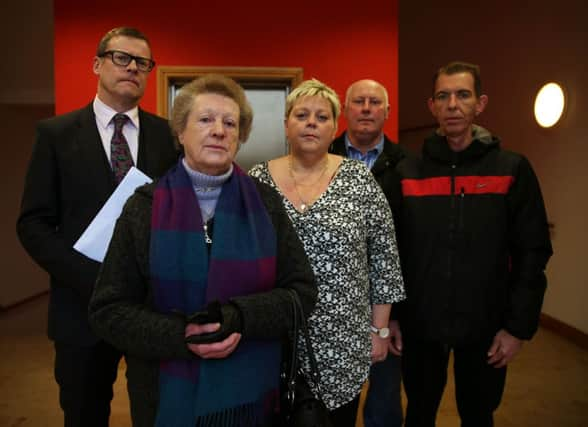murder victim’s widow to takecivil action


Margaret Campbell alleges the police and army colluded to protect the UVF gunman who shot her husband Patrick Campbell at their Cline Walk home in 1973.
No-one has ever been convicted of the killing, believed to have been carried out by the notorious Glenanne gang - a Mid-Ulster loyalist murder squad linked directly and indirectly, the family’s legal representatives claim, with the security forces.
Advertisement
Hide AdAdvertisement
Hide Ad“We hope this will bring some sort of closure,” said Mrs Campbell. “We’ve nothing to lose.
“If my husband’s death had been investigated at the time there might have been other lives saved.”
Father-of-three Patrick Campbell was gunned down on October, 29 1973, his wife and then 10-year-old daughter, Donna, narrowly escaping injury after a burst of gunfire was aimed down the hallway.
“It was horrendous,” said his widow. “It never leaves you and never will.
Advertisement
Hide AdAdvertisement
Hide Ad“When the guns went off my legs collapsed. I crawled up against a radiator and Pat came down on top of me.
“The bullets blew a hole in [Donna’s] bedroom door and they were embedded in the headboard of her bed. If she had got up she would have been dead too.”
It is claimed the alleged gunman, Robin Jackson, was a Royal Ulster Constabulary Special Branch agent.
Jackson, a former Ulster Defence Regiment soldier later dubbed The Jackal, was thought to have been behind some of the worst atrocities of the Troubles, including the 1974 Monaghan bombing and the Miami showband massacre in July, 1975.
Advertisement
Hide AdAdvertisement
Hide AdHe was a member of the Glenanne gang - a UVF terror unit linked to around 120 murders in Counties Armagh and Tyrone over a five-year period in the 1970s and it is believed Patrick Campbell was his first victim.
Jackson worked alongside Mr Campbell at Banbridge’s Down Shoes factory and it’s understood the pair had a political disagreement over the stopping of machinery following the deaths of three British soldiers.
A week after the shooting police found 79 rounds of 7.62mm ammunition at Jackson’s home and he was singled out three times by Mrs Campbell, during a police identity parade at Castlereagh RUC station, as the man responsible for producing a handgun when the killers came to her home.
RUC officers also found a notebook with names, addresses and vehicle registration details which it is alleged came from UDR intelligence sources.
Advertisement
Hide AdAdvertisement
Hide AdHowever, it was decided there was insufficient evidence to secure a conviction. Jackson, who lived in Donacloney, died in 1998, aged 50.
An investigation by the Historical Enquiries Team found that Robin Jackson’s “later notoriety, with the benefit of hindsight, raises suspicions about his involvement and gives rise to the concerns expressed by the family”.
Mrs Campbell said: “We feel the RUC failed our family. Further we believe that a significant number of RUC officers knowingly used Jackson as an agent for two decades,
“Our motivation in taking this civil case against the chief constable of the PSNI is to highlight the RUC’s failure to properly handle Jackson’s case and their subsequent unethical and collusive role in handling him as an agent.
Advertisement
Hide AdAdvertisement
Hide Ad“Pat was not just a victim of sectarian murder. He was a trade unionist, worker, father and husband of high standing within his community who deserved to live to see his children grow up and the birth of his grandchildren. Nothing can ever put that right.”
Mrs Campbell is seeking damages for sustained distress because of the alleged failings of both the PSNI/RUC and the MoD.
Solicitor Kevin Winters, who is representing the family, said: “The civil action being taken by Margaret Campbell on behalf of her family against the PSNI and the MoD is an important development in their movement towards closure, truth, justice and accountability regarding the murder of Pat Campbell in 1973.
“The litigation will expose the level of collusion which was evident in the activities of the RUC, the UDR and other state agents in the Armagh and Tyrone areas over a significant number of years and the level of impunity that was permitted and encouraged.”
The Campbell family is also being supported by the Pat Finucane Centre in taking the civil action.